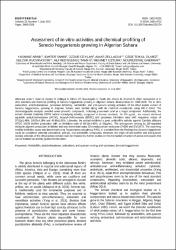Assessment of in vitro activities and chemical profiling of Senecio hoggariensis growing in Algerian Sahara

View/
Date
2022Author
Arab, YasmineŞahin, Bihter
Ceylan, Özgür
Zellagui, Amar
Ölmez Tokul, Özge
Küçükaydın, Selçuk
Tamfu, Alfred Ngenge
Gherraf, Noureddine
Öztürk, Mehmet
Metadata
Show full item recordCitation
Arab, Y., B. Sahin, O. Ceylan, A. Zellagui, O. T. Olmez, S. Kucukaydin, A. N. Tamfu, M. Ozturk, and N. Gherraf. 2022. "Assessment of in Vitro Activities and Chemical Profiling of Senecio Hoggariensis Growing in Algerian Sahara." Biodiversitas 23 (7): 3498-3506. doi:10.13057/biodiv/d230725.Abstract
The in vitro antioxidant, anticholinesterase, tyrosinase inhibitory, antibiofilm, and anti-quorum sensing activities of the ethyl acetate extract of Senecio hoggariensis, growing in Algerian Sahara, were studied along with its chemical constituents using HPLC-DAD. The chromatographic analysis unveiled seven phenolic compounds, including p-coumaric acid as a major component. Additionally, the extract showed moderate DPPH radical scavenging activity, compared to known standards. At 200 μg/mL, the extract disclosed equitable acetylcholinesterase (AChE), butyryl-cholinesterase (BChE) and tyrosinase inhibition rates with respective values of 37.01±1.48%, 18.87±4.18% and 45.99±1.81%. Likewise, the extract exhibited a good antibiofilm activity against Candida albicans ATCC 10239 biofilm production with an inhibition ratio of 59.56±0.40%, at 50µg/mL. The anti-quorum sensing by QS-regulated violacein pigment production inhibition test was determined using Chromobacterium violaceum CV026 and CV12472. The swarming motility inhibition assay was determined using Pseudomonas aeruginosa PA01. It is evident from the findings that Senecio hoggariensis could be considered potential antioxidant, anti-QS, and antibiofilm compounds. However, the origin of anti-biofilm and anti-quorum sensing activities of the ethyl acetate extract could be revealed by further studies on the mechanism of action of active compounds that can be isolated via activity-guided fractionation.

















